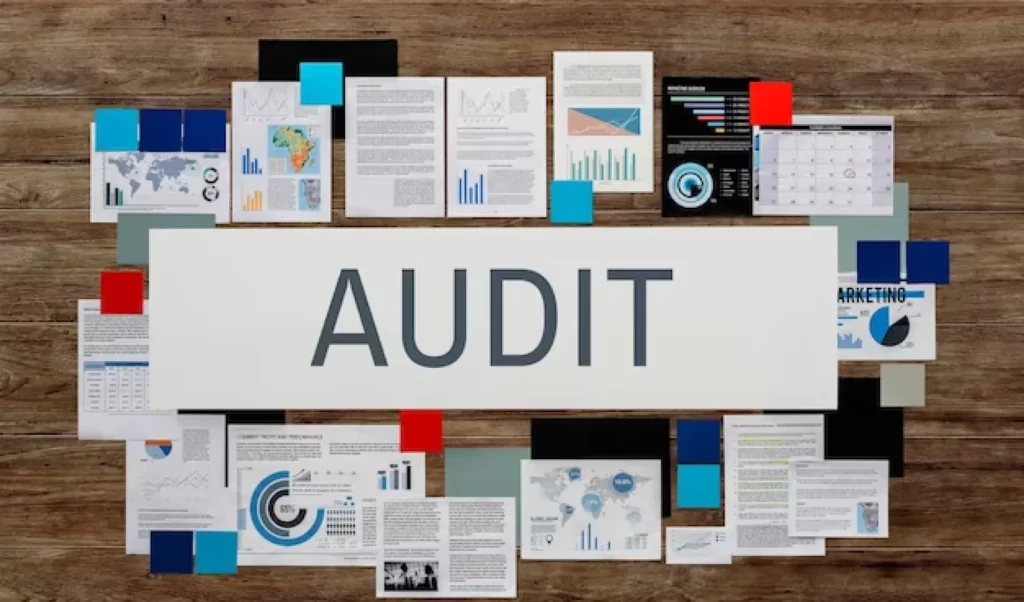Introduction
You’re sifting through your mail, and suddenly you find a letter from the IRS. The feeling of dread that follows is almost universal. But why did you get selected for an audit? Knowing the common triggers can help you prepare, or avoid an audit altogether.
What is an IRS Audit and what do you need to know about it
Definition
An IRS audit is a formal examination of a taxpayer’s accounts and financial information to ensure information is reported correctly.
Purpose
The primary aim of an audit is to verify that you’re paying the correct amount of tax, neither too little nor too much. While it is true that audits are conducted to ensure taxpayers are paying the correct amount of tax, they are also aimed at assessing the accuracy and completeness of financial statements and ensuring compliance with tax laws and regulations.
Audits serve to provide assurance to stakeholders that the financial information presented is reliable, transparent, and in accordance with applicable laws and accounting standards. So, the primary aim of an audit goes beyond just verifying the correct amount of tax but also covers a broader range of financial and regulatory aspects.

Types of IRS Audits
Correspondence Audit
During a paper audit, you may be required to submit extra documentation to support your claims or verify certain information. The exact documents needed will vary depending on the specific circumstances and the nature of the audit. Some common examples of additional documentation may include financial records, receipts, invoices, bank statements, or employment records. It is important to carefully review the request and provide all necessary documents within the specified timeframe.
Office Audit
You’ll visit an IRS office for this type of audit, typically for more complex issues. It is conducted by an IRS agent who reviews your tax records and documentation in order to verify that your tax return is accurate and in compliance with tax laws. During a field audit, you will be asked to provide supporting documentation for various items on your tax return. This may include documents such as receipts, bank statements, invoices, and other financial records. Overall, visiting an IRS office for this type of audit indicates a more in-depth review of your tax situation, and it is advisable to seek professional guidance to navigate the process effectively.
Field Audit
In this scenario, IRS agents will come to you, usually for business audits or large financial discrepancies. When audits hit businesses, you need a business tax attorney experienced with complex IRS and state matters. Provide the agents with all the requested information and documents to the best of your ability. If there are any discrepancies or issues, it is essential to address them honestly and transparently. Seeking professional assistance, such as a tax attorney or accountant, can also be beneficial in navigating the complexities of the tax system. Remember, it is always better to be proactive in resolving any potential problems rather than waiting for the IRS to discover them.
Common Triggers for an IRS Audit
1. High Income
Simply put, the higher your income, the more likely you are to be audited. The income level of individuals and businesses is one of the factors taken into consideration by tax authorities when selecting tax returns for audit. It is important to note that having a high income does not guarantee an audit, and individuals with lower incomes can also be audited if there are red flags or anomalies in their tax returns.
2. Discrepancies in Reported Income
Income that is not reported on W-2 forms (which report employee wages) or 1099 forms (which report miscellaneous income) can be seen as suspicious by the IRS. In these cases, the IRS may question the accuracy of your tax return. It is important to report all your income accurately and include any additional income sources in order to avoid any potential trouble with the IRS.
3. Excessive Deductions
Large deductions that appear to be disproportionate to your income are red flags. These large deductions may suggest potential inconsistencies or false information in your tax returns. It is essential to ensure that your deductions are reasonable, justifiable, and accurately reflect your financial situation and income level. Seeking professional tax advice can help ensure compliance with tax laws and regulations.
4. Offshore Accounts
Holding assets in offshore accounts can indeed raise eyebrows at the Internal Revenue Service (IRS). This is because offshore accounts, if not properly disclosed, can be used to evade taxes, hide income, and engage in other illegal activities. While not all offshore accounts are created for illicit purposes, the IRS has heightened its scrutiny in recent years due to the potential for tax evasion.

Red Flags
Filing Status Issues
A discrepancy in filing status refers to a situation where the reported filing status on a tax return does not match the individual’s actual circumstances or is inconsistent with other information reported on the return. It is important for taxpayers to accurately report their filing status to avoid potential penalties, audits, or other legal consequences. It is recommended to consult a tax professional or refer to official tax guidelines to determine the appropriate filing status based on one’s specific circumstances.
Home Office Deductions
One classic trigger that often leads to disproportionate deductions is making a mistake or error in a task or assignment. Implementing a more holistic approach that assesses the understanding, effort, and improvement of the individual can help reduce the impact of disproportionately high deductions triggered by classic mistakes.
Charitable Contributions
Large charitable donations relative to your income can trigger an audit. To minimize any risk of audit, it is advisable to keep accurate records and maintain supporting documentation for all charitable donations, regardless of their size relative to your income.
Freelancers and Business Owners
Business Expenses
When a business files its tax return, it is required to report its expenses accurately and claim deductions that are supported by proper documentation. If certain business expenses seem disproportionately large or unreasonable compared to industry standards or the size of the business, the IRS may flag them for closer examination.
Earning Schedule C Income
Having a Schedule C form can automatically increase your audit risk. Schedule C is used to report income and expenses from self-employment or a small business, and it is often a target for fraudulent activity or underreporting of income. Certain factors related to Schedule C can increase the likelihood of an audit, such as:
1. High expenses: Claiming excessive or disproportionate deductions, especially when compared to income, can attract the attention of the IRS. They may view this as an attempt to reduce your tax liability artificially.
2. Consistent losses: If your business consistently reports losses year after year, it could lead to suspicion that you are not operating a legitimate business but rather using it to offset income from other sources.
Being transparent and complying with tax laws will minimize the risk of an audit.
Audit Rates
While it may be true that audit rates have declined over the years, it is important not to become complacent about the need for audits. Audit rates vary across different jurisdictions and industries, but the decline can be attributed to a combination of factors such as resource constraints, changes in audit selection methodologies, and shifts in enforcement priorities.
Moreover, the decline in audit rates does not necessarily imply a decrease in the overall effectiveness of regulatory bodies. Instead, it may indicate a shift towards more targeted and risk-based auditing approaches, focusing on high-risk sectors and individuals. This means that businesses operating in such sectors or individuals with complex financial arrangements are still likely to face a higher probability of being audited.

If the IRS requests an Audit Notice: Addressing the Situation
Cooperate Fully
Don’t make the IRS’s job harder. Cooperate fully and provide all necessary documentation. The IRS has the authority to audit tax returns, and if they find any discrepancies or lack of required documentation, it can result in penalties, interest charges, or even legal actions. By providing all the required documents promptly and accurately, individuals can demonstrate their willingness to comply with tax regulations and help streamline the process for both parties involved.
Seek Professional Help
During the audit process, tax professionals and tax attorneys can be a valuable resource. They have in-depth knowledge and understanding of tax laws and regulations, making them well-equipped to handle complex tax issues. They can review the audit findings and negotiate with the tax authorities on behalf of their clients, aiming to achieve the best possible outcome. With their expertise and experience, tax professionals and attorneys can alleviate the stress and complexity of the audit process, giving individuals and businesses peace of mind. Their assistance can save time and money, as well as provide reassurance that all necessary requirements are being met.

How To Avoid an Audit
Maintain Accurate Records
Keeping impeccable records is crucial when it comes to validating every number on your tax return. It not only helps you accurately report your income, deductions, and credits but also serves as evidence in case of an audit or any discrepancy with the tax authorities. Here are some key tips for maintaining impeccable records:
- Organize all your financial documents: Set up a system to keep track of all your financial documents, including income statements, expense receipts, investment statements, and any other relevant records.
- Maintain separate accounts: Use separate bank accounts and credit cards for personal and business expenses to streamline record-keeping and avoid confusion.
- Document income sources: Keep a detailed record of all your income sources, such as earnings from employment, freelance work, rental properties, investments, and any other sources. Include relevant documents like pay stubs, invoices, bank deposit statements, and 1099s.
File Electronically
While e-filing can lower your audit risk by increasing accuracy and speeding up processing, it is important to note that it does not guarantee complete immunity from audits. Audit selection is a complex process based on several factors, including random selection, statistical analysis, and specific audit criteria. However, e-filing can effectively reduce your chances of an audit due to avoidable errors or delays associated with paper filing methods.
Be Consistent
Consistency in your filings year over year can help reduce red flags. Consistency in filings refers to maintaining a uniform and predictable pattern in submitting financial or legal documents year after year. This can be highly beneficial in reducing red flags or potential issues that may arise during the review process.
Conclusion
While an IRS audit may seem like an intimidating process, understanding the triggers can help you better prepare or even avoid an audit altogether. Keep your records clean, be honest, and when in doubt, consult a professional.
FAQs
- What percentage of people get audited by the IRS?
The IRS audits about 0.5% of individual tax returns.
- How long does an IRS audit take?
An IRS audit can take several months to complete.
- Can an audit result in a refund?
Yes, an audit can result in a refund if errors in your favor are found.
- How far back can the IRS audit?
The IRS can typically audit returns filed within the last three years, but up to six years for significant errors.
- Does filing electronically reduce my audit risk?
Filing electronically does not necessarily reduce your audit risk; it’s more about accurate reporting.








